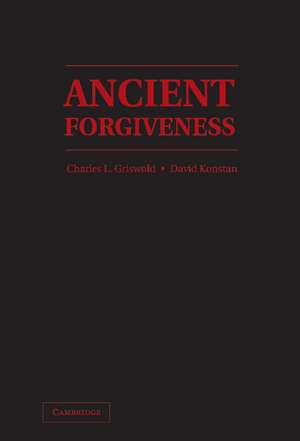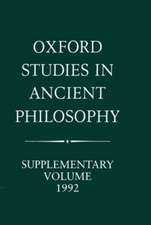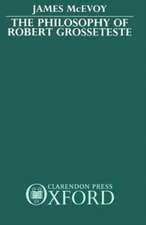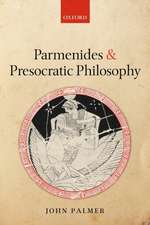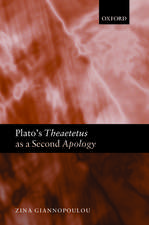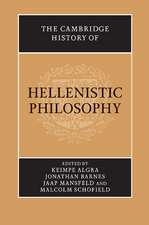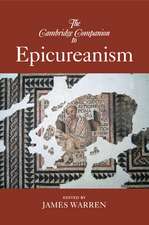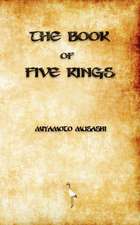Ancient Forgiveness: Classical, Judaic, and Christian
Editat de Charles L. Griswold, David Konstanen Limba Engleză Hardback – 28 dec 2011
Preț: 693.36 lei
Preț vechi: 779.06 lei
-11% Nou
Puncte Express: 1040
Preț estimativ în valută:
132.68€ • 138.87$ • 110.43£
132.68€ • 138.87$ • 110.43£
Carte tipărită la comandă
Livrare economică 31 martie-14 aprilie
Preluare comenzi: 021 569.72.76
Specificații
ISBN-13: 9780521119481
ISBN-10: 0521119480
Pagini: 278
Dimensiuni: 152 x 234 x 20 mm
Greutate: 0.5 kg
Ediția:New.
Editura: Cambridge University Press
Colecția Cambridge University Press
Locul publicării:New York, United States
ISBN-10: 0521119480
Pagini: 278
Dimensiuni: 152 x 234 x 20 mm
Greutate: 0.5 kg
Ediția:New.
Editura: Cambridge University Press
Colecția Cambridge University Press
Locul publicării:New York, United States
Cuprins
Preface Charles L. Griswold; Part I. The Territory Philosophically Considered: 1. What is forgiveness? Adam Morton; Part II. Forgiveness among the Greeks: 2. Assuaging rage: remorse, repentance and forgiveness in the classical world David Konstan; 3. Achilles, Psammenitus and Antigone: forgiveness in Homer and beyond Page duBois; 4. All in the family: forgiveness and reconciliation in new comedy Kathryn Gutzwiller; Part III. Forgiveness among the Romans: 5. The anger of tyrants and the forgiveness of kings Susanna M. Braund; 6. Gender and forgiveness in the early Roman empire Kristina Milnor; 7. 'To forgive is divine': gods as models of forgiveness in late republican and early imperial Rome Zsuzsanna Várhelyi; Part IV. Judaic and Christian Forgiveness: 8. Mercy, repentance, and forgiveness in ancient Judaism Michael L. Morgan; 9. A man had two sons: the question of forgiveness in Luke 15 Peter S. Hawkins; 10. Jesus' conditional forgiveness Jennifer W. Knust; 11. Forgiveness in patristic philosophy: the importance of repentance and the centrality of grace Ilaria L. E. Ramelli; 12. Forgiveness and perfection: Maimonides, Aquinas, and medieval departures from Aristotle Jonathan Jacobs.
Recenzii
'When and how did forgiveness become recognized as a moral attribute? The question has vexed - and divided - commentators for some years. This book admirably addresses the question in a series of wide-ranging chapters by a variety of experts. The editors have done the world of scholarship a great service by offering what I believe are now the definitive answers.' Anthony Bash, Durham University
'This volume, edited by two experts on forgiveness, is a rich and timely work treating the emotion and different conceptions of it in the ancient Greek, Roman, and Judeo-Christian traditions. Much recent work on emotions in antiquity has focused on anger, and so turning to this contrasting emotion is particularly welcome. It should appeal to graduate students and scholars in classics, philosophy, religious studies, and Judaic studies.' Ruth Caston, University of Michigan
'My previous work on forgiveness has been solidly in the analytic philosophical tradition, and this splendid collection has taught me how much that work can be improved by understanding the history of the concepts and emotions involved in forgiveness and its close relatives. Two distinguished scholars have invited … scholars of comparable distinction to contribute essays that discuss the history of forgiveness (or what might mistakenly be taken as forgiveness if we hastily project contemporary understandings) from ancient Greece and Rome, through medieval Judaism, and concluding with Aquinas. This book confirms L. P. Hartley's famous remark that 'the past is a foreign country: they do things differently there' and reveals this foreign country as a fascinating place from which all who are interested in forgiveness can learn a great deal.' Jeffrie G. Murphy, Arizona State University
'This book seeks to reveal the relationship between conceptual and historical inquiry. Its excellent chapters offer, through a series of well-chosen examples, an illuminating promenade from Homer to Maimonides and Thomas Aquinas, through Seneca, Jesus and the Rabbis, on a topic of at once perennial and contemporary great significance. The book opens up new vistas for the interdisciplinary study of the roots of Western cultural tropes. It is significant, in particular, that the editors, a classicist and a philosopher, recognize the necessity to integrate Jewish and Christian approaches, side by side with the Greco-Roman tradition, in order to decipher our own cultural inheritance.' Guy Stroumsa, Oxford University
'This volume, edited by two experts on forgiveness, is a rich and timely work treating the emotion and different conceptions of it in the ancient Greek, Roman, and Judeo-Christian traditions. Much recent work on emotions in antiquity has focused on anger, and so turning to this contrasting emotion is particularly welcome. It should appeal to graduate students and scholars in classics, philosophy, religious studies, and Judaic studies.' Ruth Caston, University of Michigan
'My previous work on forgiveness has been solidly in the analytic philosophical tradition, and this splendid collection has taught me how much that work can be improved by understanding the history of the concepts and emotions involved in forgiveness and its close relatives. Two distinguished scholars have invited … scholars of comparable distinction to contribute essays that discuss the history of forgiveness (or what might mistakenly be taken as forgiveness if we hastily project contemporary understandings) from ancient Greece and Rome, through medieval Judaism, and concluding with Aquinas. This book confirms L. P. Hartley's famous remark that 'the past is a foreign country: they do things differently there' and reveals this foreign country as a fascinating place from which all who are interested in forgiveness can learn a great deal.' Jeffrie G. Murphy, Arizona State University
'This book seeks to reveal the relationship between conceptual and historical inquiry. Its excellent chapters offer, through a series of well-chosen examples, an illuminating promenade from Homer to Maimonides and Thomas Aquinas, through Seneca, Jesus and the Rabbis, on a topic of at once perennial and contemporary great significance. The book opens up new vistas for the interdisciplinary study of the roots of Western cultural tropes. It is significant, in particular, that the editors, a classicist and a philosopher, recognize the necessity to integrate Jewish and Christian approaches, side by side with the Greco-Roman tradition, in order to decipher our own cultural inheritance.' Guy Stroumsa, Oxford University
Descriere
This book explores the nature and place of forgiveness in the pre-modern Western world.
